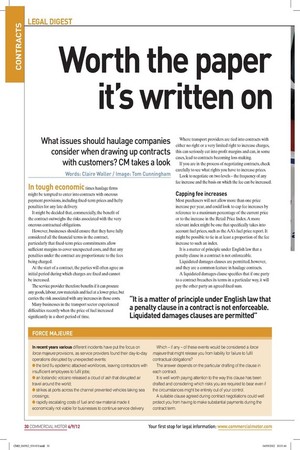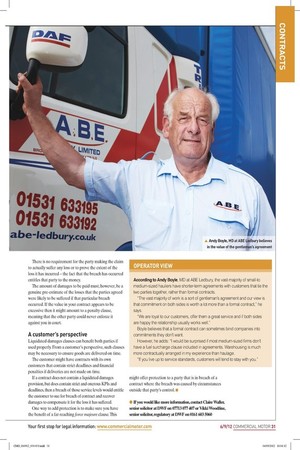Worth the paper it’s written on
Page 23

Page 24

If you've noticed an error in this article please click here to report it so we can fix it.
What issues should haulage companies consider when drawing up contracts with customers? CM takes a look
Words: Claire Waller / Image: Tom Cunningham
In tough economic times haulage irms might be tempted to enter into contracts with onerous payment provisions, including ixed-term prices and hefty penalties for any late delivery.
It might be decided that, commercially, the beneit of the contract outweighs the risks associated with the very onerous contractual obligations.
However, businesses should ensure that they have fully considered all the inancial terms in the contract, particularly that ixed-term price commitments allow suficient margins to cover unexpected costs, and that any penalties under the contract are proportionate to the fees being charged.
At the start of a contract, the parties will often agree an initial period during which charges are ixed and cannot be increased.
The service provider therefore beneits if it can procure any goods, labour, raw materials and fuel at a lower price, but carries the risk associated with any increases in those costs.
Many businesses in the transport sector experienced dificulties recently when the price of fuel increased signiicantly in a short period of time. Where transport providers are tied into contracts with either no right or a very limited right to increase charges, this can seriously eat into proit margins and can, in some cases, lead to contracts becoming loss-making.
If you are in the process of negotiating contracts, check carefully to see what rights you have to increase prices.
Look to negotiate on two levels – the frequency of any fee increase and the basis on which the fee can be increased.
Capping fee increases
Most purchasers will not allow more than one price increase per year, and could look to cap fee increases by reference to a maximum percentage of the current price or to the increase in the Retail Price Index. A more relevant index might be one that speciically takes into account fuel prices, such as the AA’s fuel price report. It might be possible to tie in at least a proportion of the fee increase to such an index.
It is a matter of principle under English law that a penalty clause in a contract is not enforceable.
Liquidated damages clauses are permitted, however, and they are a common feature in haulage contracts.
A liquidated damages clause speciies that if one party to a contract breaches its terms in a particular way, it will pay the other party an agreed ixed sum. There is no requirement for the party making the claim to actually suffer any loss or to prove the extent of the loss it has incurred – the fact that the breach has occurred entitles that party to the money.
The amount of damages to be paid must, however, be a genuine pre-estimate of the losses that the parties agreed were likely to be suffered if that particular breach occurred. If the value in your contract appears to be excessive then it might amount to a penalty clause, meaning that the other party could never enforce it against you in court.
A customer’s perspective
Liquidated damages clauses can beneit both parties if used properly. From a customer’s perspective, such clauses may be necessary to ensure goods are delivered on time.
The customer might have contracts with its own customers that contain strict deadlines and inancial penalties if deliveries are not made on time.
If a contract does not contain a liquidated damages provision, but does contain strict and onerous KPIs and deadlines, then a breach of those service levels would entitle the customer to sue for breach of contract and recover damages to compensate it for the loss it has suffered.
One way to add protection is to make sure you have the beneit of a far-reaching force majeure clause. This might offer protection to a party that is in breach of a contract where the breach was caused by circumstances outside that party’s control. n l If you would like more information, contact Claire Waller, senior solicitor at DWF on 07713 077 407 or Vikki Woodfne, senior solicitor, regulatory at DWF on 0161 603 5060
FORCE MAJEURE
In recent years various different incidents have put the focus on force majeure provisions, as service providers found their day-to-day operations disrupted by unexpected events:
• the bird flu epidemic attacked workforces, leaving contractors with insufficient employees to fulfil jobs; • an Icelandic volcano released a cloud of ash that disrupted air travel around the world; • strikes at ports across the channel prevented vehicles taking sea crossings; • rapidly escalating costs of fuel and raw material made it economically not viable for businesses to continue service delivery.
Which – if any – of these events would be considered a force majeure that might release you from liability for failure to fulfil contractual obligations?
The answer depends on the particular drafting of the clause in each contract.
It is well worth paying attention to the way this clause has been drafted and considering which risks you are required to bear even if the circumstances might be entirely out of your control.
A suitable clause agreed during contract negotiations could well protect you from having to make substantial payments during the contract term.
OPERATOR VIEW
According to Andy Boyle, MD at ABE Ledbury, the vast majority of small-to medium-sized hauliers have shorter-term agreements with customers that tie the two parties together, rather than formal contracts.
“The vast majority of work is a sort of gentleman’s agreement and our view is that commitment on both sides is worth a lot more than a formal contract,” he says.
“We are loyal to our customers, offer them a great service and if both sides are happy the relationship usually works well.” Boyle believes that a formal contract can sometimes bind companies into commitments they don’t want.
However, he adds: “I would be surprised if most medium-sized firms don’t have a fuel surcharge clause included in agreements. Warehousing is much more contractually arranged in my experience than haulage.
“If you live up to service standards, customers will tend to stay with you.”











































